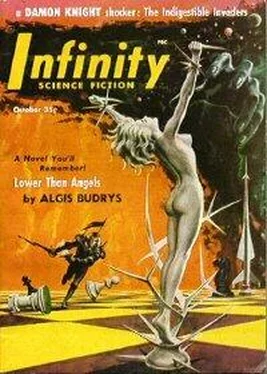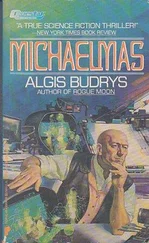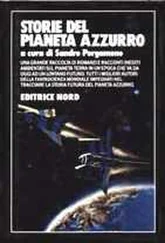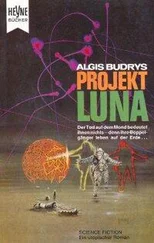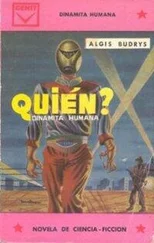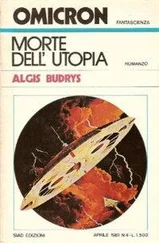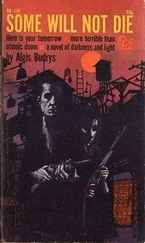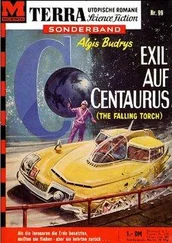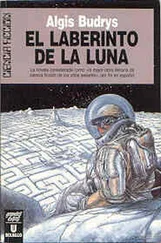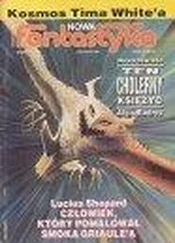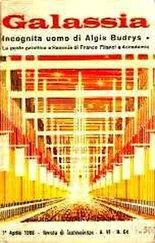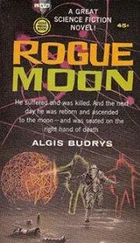Lower Than Angels
by Algis Budrys
This was almost the end: Fred Imbry, standing tiredly at the jungle’s edge, released the anchoring field. Streaming rain immediately began coming down on the parked sub-ship on the beach. The circle of sand formerly included in the field now began to splotch, and the sea dashed a wave against the landing jacks. The frothing water ran up the beach and curled around Imbry’s ankles. In a moment, the sand was as wet as though nothing had ever held that bit of seashore free.
The wind was still at storm force. Under the boiling gray sky, the craft shivered from half-buried landing jacks to needle-nosed prow. Soggy fronds plastered themselves against the hull with sharp, liquid slaps.
Imbry trudged across the sand, slopping through the water, wiping rain out of his face. He opened the sub-ship’s airlock hatch and stopped, turning for one look back into the jungle.
His exhausted eyes were sunk deep into his face. He peered woodenly into the jungle’s surging undergrowth. But there was no sign of anyone’s having followed him; they’d let him go. Turning back, he hoisted himself aboard the ship and shut the hatch behind him. He opened the inside hatch and went through, leaving wet, sandy footprints across the deck.
He lay down in his piloting couch and began methodically checking off the board. When it showed green all around, he energized his starting engines, waited a bit, and moved his power switch to Atmospheric .
The earsplitting shriek of the jet throats beat back the crash of the sea and the keening of the wind. The jungle trees jerked away from the explosion of billowing air, and even the sea recoiled. The ship danced off the ground, and the landing jacks thumped up into their recesses. The sand poured out a shroud of towering steam.
The throttles advanced, and Imbry ascended into Heaven on a pillar of fire.
Almost at the beginning, a week earlier, Fred Imbry had been sitting in the Sainte Marie’s briefing room for the first time in his life, having been aboard the mother ship a little less than two weeks. He sat*there staring up at Lindenhoff, whose reputation had long ago made him one of Imbry’s heroes, and hated the carefully schooled way the Assignment Officer could create the impression of a judgment and capacity he didn’t have.
Around Imbry, the other contact crewmen were listening carefully, taking notes on their thigh pads as Lindenhoffs pointer rapped the schematic diagram of the solar system they’d just moved into. Part of Imbry’s hatred was directed at them, too. Incompetents and cowards though most of them were, they still knew Lindenhoff for what he was. They’d all served under him for a long time. They’d all been exposed to his dramatics. They joked about them. But now they were sitting and listening for all the world as if Lindenhoff was what he pretended to be—the fearless, resourceful leader in command of the vast, idealistic enterprise that was embodied in the Sainte Marie . But then, the mother ship, too, and the corporation that owned her, were just as rotten at the core.
Lindenhoff was a bear of a man. He was dressed in iron-gray coveralls; squat, thick, powerful-looking, he moved back and forth on the raised platform under the schematic. With the harsh overhead lighting, his close-cropped skull looked almost bald; naked and strong, a turret set on the short, seamed pillar of his neck. A thick white scar began over his right eye, crushed down through the thick jut of his brow ridge, the mashed arch of his blunt nose, and ended on the staved-in cheekbone under his left eye. Except for the scar, his face was burned brown and leathery, and even his lips were only a different shade of brown. The bright gold color of his eyebrows and the yellow straw of his lashes came close to glowing’ in contrast.
His voice was pitched deep. He talked in short, rumbled sentences. His thick arm jerked sharply each time he moved the pointer.
“Coogan, you’re going into IV. You’ve studied the aerial surveys. No animal life. No vegetation. All naked rock where it isn’t water. Take Petrick with you and do a mineralogical survey. You’ve got a week. If you hit anything promising, I’ll extend your schedule. Don’t go drawing any weapons. No more’n it takes to keep you happy, anyhow. Jusek’s going to need ’em on VII.”
Imbry’s mouth twitched in disgust. The lighting. The platform on which Lindenhoff was shambling back and forth, never stumbling even when he stepped back without looking behind him. The dimensions of that platform must be clearly imprinted in his mind. Every step was planned, every gesture practiced. The sunburn, laid down by a battery of lamps. The careful tailoring of the coveralls to make that ursine body look taller.
Coogan and Petrick. The coward and the secret drunkard. Petrick had left a partner to die on a plague world. Coogan had shot his way out of a screaming herd of reptiles on his third contact mission—and had never gone completely unarmed, anywhere, in the ten years since.
The rest of them were no better. Ogin had certified a planet worthless. A year later, a small scavenger company had found a fortune in wolfram not six miles away from his old campsite. Lindenhoff hadn’t seen fit to fire him. Kenton, the foul-minded pathological liar. Maguire, who hated everything that walked or flew or crept, who ripped without pity at every world he contacted, and whose round face, with its boyish smile, was always broadcast along with a blushingly modest interview whenever the Sainte Marie’s latest job of opening up a new solar system was covered by the news programs.
Most of those programs, Imbry’d found out in the short time he’d been aboard, were bought and paid for by the Sainte Marie Development Corporation’s public relations branch.
His thin hands curled up into tight knots.
The mother ships and the men who worked out of them were the legends of this generation—with the Sainte Marie foremost among them. Constantly working outward, putting system after system inside the known universe, they were the bright hungry wave of mankind reaching out to gather in the stars. The men were the towering figures marching into the wilderness—the men who died unprotestingly in the thousand traps laid by the unknown darkness beyond the Edge; the men who beat their way through the jungles of the night, leaving broad roads behind them for civilization to follow.
He had come aboard this ship like a man fulfilling a dream—and found Coogan sitting in the crew lounge.
“Imbry, huh? Pull up a chair. My name’s Coogan.” He was whipcord lean; a wiry, broad-mouthed man with a tough, easy grin and live brown eyes. “TSN man?”
Imbry’d shaken his hand before he sat down. It felt a little unreal, actually meeting a man he’d heard so much about, and having him act as friendly as this.
“That’s right,” Imbry said, trying to sound as casual as he could under the circumstances. Except for Lindenhoff and possibly Maguire, Coogan was the man he most admired. “My enlistment finally ran out last week. I was a rescue specialist.”
Coogan nodded. “We get some good boys that way.” He grinned and chuckled. “So Old Smiley slipped you a trial contract and here you are, huh?”
“Old Smiley?”
“Personnel manager. Glad hand, looks sincere, got distinguished white hair.”
“Oh. Mr. Redstone.”
Coogan grinned. “Sure. Mr. Redstone. Well—think you’ll like it here?”
Imbry nodded. “It looks like it,” he said carefully. He realized he had to keep his enthusiasm ruthlessly under control, or else appear to be completely callow and juvenile. Even before he’d known what he’d do after he got out, he’d been counting the days until his TSN enlistment expired. Having the Corporation offer him a contract on the day of his discharge had been a tremendous unexpected bonus. If he’d been sixteen instead of twenty-six, he would have said it was the greatest thing that could have happened to him. Being twenty-six, he said, “I figure it’s a good deal.”
Читать дальше
